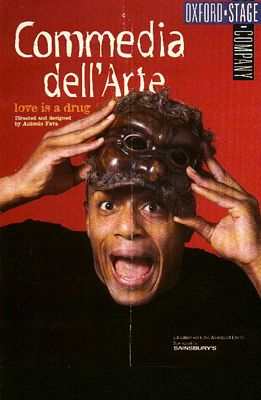COMMEDIA
DELL'ARTE - LOVE IS A DRUG
Venue: Watford Palace 1995
Company: Oxford Stage Company
Directed and designed by Antonio Fava
Venue: Watford Palace 1995
Company: Oxford Stage Company
Directed and designed by Antonio Fava

| Romeo and Juliet meets the Keystone Cops... |
Young lovers conspire to avoid a father's marriage plans, setting off an unstoppable, unpredictable series of farcical events.Using zany handmade leather masks, the colourful tradition of Italian Comedy is married with up to the minute English satire as seven actors improvise on an original Commedia dell'Arte story. Italian maestro Fava directs this raucous tale where men dress as women and ghosts rise from the grave....anything could happen and nothing is quite as it seems. |
Review
Guardian: Robin Thornber
Guardian: Robin Thornber
If the jokes feel familiar, that is the point. Most of them are 400 years old, tried and tested. Oxford Stage Company’s latest tour celebrates the commedia dell’arte form that was the source of pantomime, stand-up and situation comedy. It had the audience on its feet at the end. This is the first time that Antonio Fava, one of the leaders of the commedia revival in Italy, has worked with an English professional company. As director and designer, he has coached the performers in the techniques of movement and improvisation that bring to life the stock characters of greedy, randy old men, frustrated romantic lovers and wily, bungling servants. With Dario Fo and Jacques Lecoq, Fava has thoroughly researched the clowning traditions – such as the use of masks – which had almost been wiped out, even in Italy, by modern approaches to text-based theatre. One of those traditions is the scenario – an outline plot framework which leaves the actors free to ad-lib local and topical references as they tour village squares outside of establishment patronage.
So Love Is A Drug, devised by Renata Allen, is taken from a sixteenth century Ur-text (Flamino Scala’s La Creduta Morta, The Woman Who Appeared Dead, not entirely unrelated to Romeo and Juliet) and up-dated nightly. This is real actors’ theatre, where performers are not just allowed but encouraged to use their minds as well as their bodies and voices, and to play to the audience rather than the script. The importance of the relationship between the actors working in this way is even spelled out in a Noises Off sort of play-within-the-play (or maybe just outside and around it), which gives a real edge to the balance between cooperation and competition within the company.
I wouldn’t want to single out any of the seven, equally dedicated performers (Jonathan Coyne, Andrew Dennis, Clive Duncan, Kate Fleetwood, Andrew Frame, William Lawrence and Lisa Turner) but the first night audience selected Turner for a spontaneous burst of applause for her brave, scat mad scene as Isabella. Sometimes it seems unsubtle, predictable, peasant humour. Vulgar it is, in the best sense. Yet it combines a rigorous, academic historicism – this is archaeology into the roots of theatre – with sudden flashes of “Oh, that’s where that came from!” that you can relate to current West End or last night’s television. I laughed and learned a lot – not least from the Oxford Stage Company’s informative, well-designed booklet of a programme.